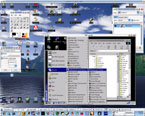 June
Linux Shareware
Are You being Served?
This month, we
look at some of the more recent additions to the Linux server space. Since
a typical Linux distribution comes with enough software to perform most of
the tasks and basic network services required, we investigate some of the
newer and rarer gems of Linux server software.
By Mike McCana
|
| Section Index |
| Products in
this section:
Windows: CoffeeCup
GIF Animator 4.0,
InoculateIT
Personal Edition 5.0.1, SiSoft
SANDRA 2000.3.6.3, WindowBlinds 1.2,
Windows Commander 4.03
OS/2: Answering
Machine/2 1.99d, CapiTel
3.37, FAM/2 1.07, The
Basic Answering Machine for OS/2
Mac: Anarchie
Pro 3.7, Fortify 2.2.6, ICQ
2.0 Beta, iVisit 2.3b7, OptimaHTML
2.0
Linux: Chili!soft
ASP, Citrix
Metaframe Client, Ethereal, Nessus,
Virtual Network Computing
|
|




